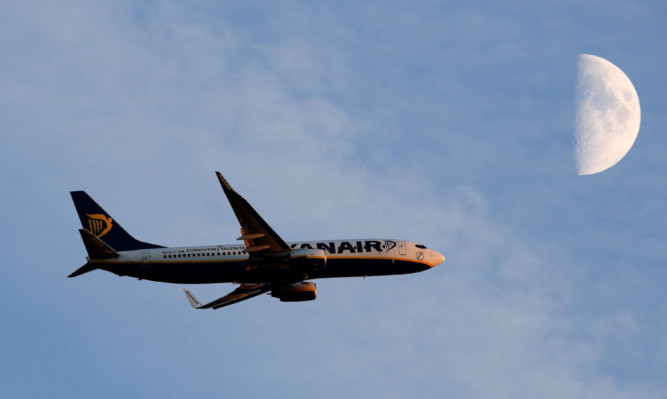Ryanair warned rivals it is confident of winning a significant chunk of the Scotland-London business market this winter with its return to the UK’s big two domestic routes.
The Dublin-based low-cost airline raised its annual profit forecast by almost 20% to 770 million euros (£602m) yesterday thanks to a surge in winter bookings of two million extra passengers.
Fares on the three-times daily business schedules on Glasgow-London and Edinburgh-London flights are 50% lower than those charged by Easyjet or British Airways.
Ryanair said it would also cut fares by up to 10 % in the new year to take more market share from airline rivals.
Predicted profit after tax for the year to March is higher than forecast at 620m euros to 650m euros and well ahead of an average forecast of 694m euros in a company poll of analysts.
The company reported strong half-yearly results with net profit up 32% to 795m euros.
Traffic grew 4% to 51.3 million customers, average fares increased 5%, and total revenues rose 9% to 3,537m euros.
Unit costs fell 2%, and Ryanair expects the sale of two million more tickets over the winter will consolidate its position as the largest passenger airline in Europe.
Annual numbers are estimated to be up 8.5% at 89 million.
Chief executive Michael O’Leary said: “We’ve had a bumper half year and we’ve had to boost our guidance as we got visibility on the second half of the year.
“We are keeping prices low while improving the service. It’s as simple as that.”
A new business class fare offering a number of perks for an extra 50 euros is expected to help drive the winter season, Mr O’Leary said, and the annual marketing budget has tripled to 35m euros.
Forward bookings on new routes to Cologne, Gdansk, Glasgow and Warsaw are building quickly; inroads are being made in Italian and German domestic markets, and progress is expected in the high-fare Scandinavian region.
Ryanair hailed its change of policy to sell more tickets earlier as it reduced the number of empty seats and increased last-minute fares.
It has attempted to lock in recent oil price falls, hedging 90% of its fuel needs for the year to March 2016 at around $93 per barrel, and will try to extend that.
The airline has signed a deal for up to 200 additional Boeing aircraft between 2019 and 2024 with extra seats and more legroom, which would “significantly lower” unit costs and enable a further fares cut.
In Dublin, shares in Ryanair rose more than 7%.
